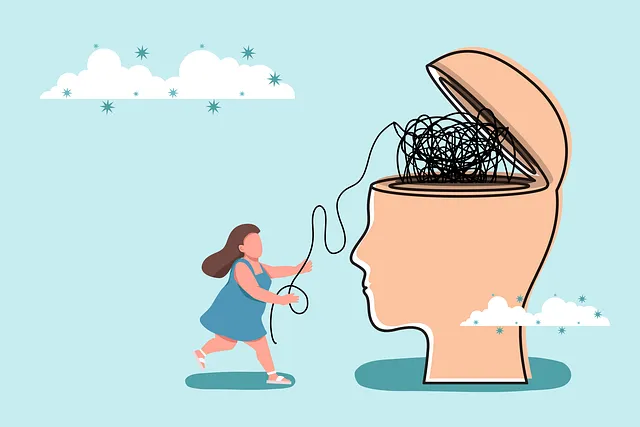Media portrayal significantly impacts societal understanding and treatment of mental health, with positive depictions encouraging help-seeking behaviors and reducing stigma. Negative stereotypes, however, can marginalize communities and hinder access to care, such as that offered by Kaiser Permanente mental health Broomfield services. To counter this, media outlets must embrace inclusive storytelling and collaborate with experts like Kaiser Permanente. Community outreach programs, workshops, peer support groups, and art exhibitions promote understanding and reduce stigma. Kaiser Permanente's strategy focuses on preventive self-care routines and emotional intelligence to improve mental health outcomes for diverse Broomfield communities.
In today’s media landscape, accurate representation of mental illness is crucial for shaping public perception and fostering understanding. This article explores the profound impact of media portrayal on mental health attitudes, highlighting challenges and presenting solutions. We delve into successful initiatives like Kaiser Permanente’s efforts in Broomfield, promoting positive mental health narratives. Additionally, we offer effective strategies to challenge negative stereotypes prevalent in media and society, ultimately aiming to revolutionize how mental illness is portrayed and perceived.
- Understanding the Impact of Media Portrayal on Mental Health Perception
- Kaiser Permanente's Approach to Promoting Positive Mental Health Representation
- Effective Strategies to Challenge Negative Stereotypes in Media and Society
Understanding the Impact of Media Portrayal on Mental Health Perception

The media plays a significant role in shaping societal perceptions about mental health, often influencing how individuals understand and respond to various psychiatric conditions. Positive and accurate representation in media can encourage help-seeking behaviors, reduce stigma, and foster empathy among the public. Conversely, negative or stereotypical portrayals can perpetuate misconceptions, lead to further marginalization of affected communities, and hinder access to appropriate care, such as that offered by Kaiser Permanente mental health Broomfield services.
Understanding these impacts is crucial, especially considering the influence media has on younger audiences who may mimic behaviors portrayed on screen. Crisis Intervention Guidance and Cultural Sensitivity in Mental Healthcare Practice are essential tools for navigating these challenges. By promoting authentic and diverse representations of mental illness, media can contribute to better emotional regulation within society, leading to more effective support systems and improved outcomes for individuals facing mental health crises.
Kaiser Permanente's Approach to Promoting Positive Mental Health Representation

Kaiser Permanente, a renowned healthcare organisation, has taken significant steps to promote positive mental health representation in media and society at large. Their approach is centred around empowering individuals with tools and knowledge for better emotional well-being. One of their key initiatives involves encouraging self-care routine development for better mental health. By fostering open conversations about mental illness, Kaiser Permanente aims to reduce stigma and provide accessible resources to support those facing challenges.
The organisation places a strong emphasis on emotional intelligence as a tool for prevention and early intervention. They offer educational programs and workshops that teach individuals how to recognise and manage their emotions effectively, thereby promoting resilience and overall mental wellness. This strategy aligns with their broader mission to cater to the Kaiser Permanente mental health Broomfield needs of diverse communities, ensuring everyone has access to evidence-based solutions for improving their mental health and well-being, including depression prevention programs tailored to specific populations.
Effective Strategies to Challenge Negative Stereotypes in Media and Society

To effectively challenge negative stereotypes surrounding mental illness, media outlets and society at large must adopt inclusive storytelling practices. The representation of mental health conditions should reflect their complexity and diversity, moving away from simplistic and often harmful narratives. Encouraging diverse voices in both front and behind the camera can contribute to this shift. For instance, individuals with lived experiences of mental illness can offer powerful perspectives that dispel myths and foster empathy.
Moreover, media organizations can collaborate with mental health experts, such as those at Kaiser Permanente Broomfield, to ensure accurate and sensitive portrayal. Implementing community outreach programs focused on Mental Health Awareness can also play a pivotal role in challenging stereotypes. These initiatives could include educational workshops, peer support groups, and art exhibitions that give platforms to individuals’ stories, thereby promoting understanding and reducing stigma. Stress Reduction Methods can be integrated into these programs, empowering communities to manage their well-being and fostering an environment of open dialogue about mental health.
Mental illness representation in media significantly impacts public perception, often perpetuating negative stereotypes. By understanding this influence, organizations like Kaiser Permanente in Broomfield are taking proactive steps to promote positive mental health narratives. Their initiatives showcase the power of responsible media portrayal in challenging societal biases and fostering a more inclusive, supportive environment for individuals dealing with mental health issues. Through education, collaboration, and diverse storytelling, we can collectively revolutionize how mental illness is perceived and treated in our society.






